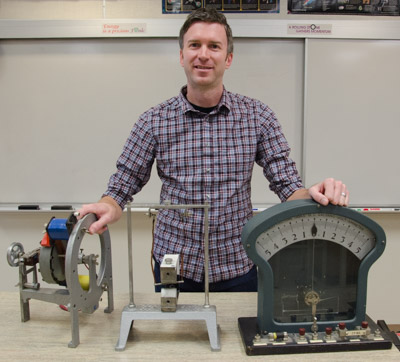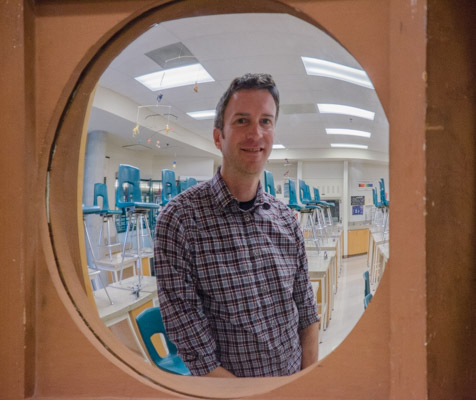Teacher’s backyard inspires love for science
April 19, 2017 - 9 minutes read Jeff Green, who teaches physics at West Vancouver Secondary School, caught the bug for science as a child growing up in Northern Ontario, where he had access to a backyard rink, skiing, camping and fishing.
Jeff Green, who teaches physics at West Vancouver Secondary School, caught the bug for science as a child growing up in Northern Ontario, where he had access to a backyard rink, skiing, camping and fishing.
“I grew up in the woods, and science was my favourite subject at school,” says Jeff. “One thing I knew when I was finished with my first degree is that I didn’t want to work in a lab, so when a few of my friends went through the teaching program, I decided I would give it a try, and found that I really liked it.”
After completing his B.Sc. and B.Ed. from Lakehead University in 2000, he moved west in 2002, applying to all Metro districts before he left his home province. On arrival, he called around to update his contact information, and was asked to interview for a position at Sentinel. He got the job, and then moved to WVSS the following fall, where he has been ever since, mainly teaching grades 11-12 Physics and Junior Science.
“Students in the Physics 11 and 12 classes are generally there because they love the subject, or have to take the course in order to get into a program they want at post-secondary school,” explains Jeff. “In Science 10, which everyone has to take, it can be a little more challenging in terms of classroom management, but you do get to explore a wider variety of concepts, so I love to get those classes, as we get to look at everything from genetics to chemistry to plate tectonics and radioactive dating. You have to teach everybody, not just those who excel in a subject.”
Strong connections with other physics teachers have helped Jeff add fun in the classroom, as he picks up on good ideas from WVSS teachers past and present. One of the most durable contributions came from Gord Trousdell, a popular teacher who inspired colleagues and students alike with some big projects and ideas that generated excitement in and outside of the classroom. It was Gord’s use of ‘engagement badges’ in the classroom, which offer students opportunities to earn badges by going outside the curriculum, that inspires kids every year, as Jeff has adopted them permanently into his classroom. There are about 10 digital badges that students can earn, including a book badge, a fermentation badge, a coding badge and a gardening badge, among others. Jeff says the system works especially well, now that the curriculum has become less prescribed, freeing up time to do more creative things.
Jeff has also had the privilege of working with retired WVSS physics teacher John Brimacombe, who taught him so much when he was just starting out. John’s name still comes up among physics teachers elsewhere in the province. Today he works with Jerry Espenhain, who grew up building houses and fixing cars. His hands-on, practical abilities have really been useful as he is able to make numerous real-life connections to the concepts taught in class.
Teaching such a complex subject can be demanding, but because Jeff also teaches both the Standard and Higher Level IB physics course, his own deep understanding of the material is helpful. “Lots of times, it’s the challenge of making extremely difficult and abstract concepts, such as special or general relativity, quantum mechanics, or particle physics, understandable and interesting for students, but for those who excel at it, the Higher Level IB course offers students an opportunity to get first year university credit.”
Technology has been one of the main differences over the decade and a half since Jeff started teaching: today, for example, rather than camcorders, smart phones can be used to analyze motion. Video analysis of concepts such as force, momentum and energy can be thoroughly explored using features like slow motion video – so much so, that it can be hard to come up with labs that don’t use them. There are also a number of good instructional channels and videos, including one from former WVSS student Derek Muller, who created Veritasium.
The physics team has also worked hard to build inquiry based laboratories into the program, where students come with their own question and immerse themselves in finding answers.
“Physics 12 and Calculus 12 are the hardest classes in the school,” says Jeff. “Even students who have not had to struggle sometimes find these subjects challenging. But as the robotics team says, when you fail fast and fail often and learn from your mistakes, you will improve. We assess students based on how they’re doing at the end of the year, so that we reward students for that improvement.”
Jeff, says it’s really important to get to know students outside the class. Every year, he gets involved in the life of the school, and has coached the tennis club since he started. His team has qualified for the provincial championships seven times. This year West Vancouver’s Physics Olympics team took first place overall in the UBC Physics Olympics for the first time since 1984. The team has come in 5th on two occasions, and took 2nd place twice since 2008. He’s also sponsoring the computer programming and physics club, which are student-led. He decided to get involved in computer coding to learn basic Python programming.
 “Physics is one of those subjects where teachers still have a big role as the classroom expert,” says Jeff. “But there are many students who are way ahead in computer programming, and getting involved with the club means that I’m getting them to teach me.”
“Physics is one of those subjects where teachers still have a big role as the classroom expert,” says Jeff. “But there are many students who are way ahead in computer programming, and getting involved with the club means that I’m getting them to teach me.”
Some of Jeff’s favourite stories involve the connections with kids who return for visits. He’s heard from former students who are now doctors doing high level cancer research and from major players at Facebook, Tesla, Google and Samsung.
“It’s great to hear them come back to say that the course was tough, but it really prepared them. Ultimately, I know that when they’re in my classroom, I’m preparing them for university. I remember one IB student who struggled with the class a lot, barely graduating with his IB diploma, but he got admitted to UBC Engineering. In second year, something clicked and his perseverance paid off – today he’s a mining engineer.”
Jeff and his wife, who also recently started teaching, enjoy travel, tennis, baseball, hiking, cycling, reading, gardening and cooking.
“Outside of school, I think that reading and travelling are the two best ways to learn.” Another good piece of advice from Jeff, who also says that new teachers should always try new things – whether in the courses you’re teaching, the roles you take on or the lessons you use – always mix it up!